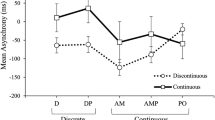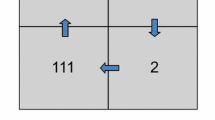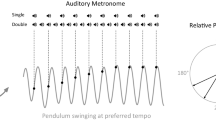Abstract
Previously, it has been shown that synchronising actions with periodic pacing stimuli are unaffected by ageing. However, synchronisation often requires combining evidence across multiple sources of timing information. We have previously shown the brain integrates multisensory cues to achieve a best estimate of the events in time and subsequently reduces variability in synchronised movements (Elliott et al. in Eur J Neurosci 31(10):1828–1835, 2010). Yet, it is unclear if sensory integration of temporal cues in older adults is degraded and whether this leads to reduced synchronisation performance. Here, we test for age-related changes when synchronising actions to multisensory temporal cues. We compared synchronisation performance between young (N = 15, aged 18–37 years) and older adults (N = 15, aged 63–80 years) using a finger-tapping task to auditory and tactile metronomes presented unimodally and bimodally. We added temporal jitter to the auditory metronome to determine whether participants would integrate auditory and tactile signals, with reduced weighting of the auditory metronome as its reliability decreased under bimodal conditions. We found that older adults matched the performance of young adults when synchronising to an isochronous auditory or tactile metronome. When the temporal regularity of the auditory metronome was reduced, older adults’ performance was degraded to a greater extent than the young adults in both unimodal and bimodal conditions. However, proportionally both groups showed similar improvements in synchronisation performance in bimodal conditions compared with the equivalent, auditory-only conditions. We conclude that while older adults become more variable in synchronising to less regular beats, they do not show any deficit in the integration of multisensory temporal cues, suggesting that using multisensory information may help mitigate any deficits in coordinating actions to complex timing cues.



Similar content being viewed by others
References
Alais D, Burr D (2004) The ventriloquist effect results from near-optimal bimodal integration. Curr Biol 14:257–262. doi:10.1016/j.cub.2004.01.029
Allison L, Kiemel T, Jeka J (2006) Multisensory reweighting of vision and touch is intact in healthy and fall-prone older adults. Exp Brain Res 175:342–352. doi:10.1007/s00221-006-0559-7
Aschersleben G, Prinz W (1995) Synchronizing actions with events: the role of sensory information. Percept Psychophys 57:305–317
Aschersleben G, Gehrke J, Prinz W (2001) Tapping with peripheral nerve block. Exp Brain Res 136:331–339. doi:10.1007/s002210000562
Beauchet O, Annweiler C, Dubost V, Allali G, Kressig RW, Bridenbaugh S, Berrut G et al (2009) Stops walking when talking: a predictor of falls in older adults? Eur J Neurol 16:786–795. doi:10.1111/j.1468-1331.2009.02612.x
Chen HY, Wing AM, Pratt D (2006) The synchronisation of lower limb responses with a variable metronome: the effect of biomechanical constraints on timing. Gait Posture 23:307–314. doi:10.1016/j.gaitpost.2005.04.001
Drewing K, Aschersleben G, Li SC (2006) Sensorimotor synchronization across the life span. Int J of Behav Dev 30:280–287. doi:10.1177/0165025406066764
Elliott MT, Welchman AE, Wing AM (2009a) Being discrete helps keep to the beat. Exp Brain Res 192:731–737. doi:10.1007/s00221-008-1646-8
Elliott MT, Welchman AE, Wing AM (2009b) MatTAP: a MATLAB toolbox for the control and analysis of movement synchronisation experiments. J Neurosci Methods 177:250–257. doi:10.1016/j.jneumeth.2008.10.002
Elliott MT, Wing AM, Welchman AE (2010) Multisensory cues improve sensorimotor synchronisation. Eur J Neurosci 31:1828–1835. doi:10.1111/j.1460-9568.2010.07205.x
Ernst MO, Banks MS (2002) Humans integrate visual and haptic information in a statistically optimal fashion. Nature 415:429–433. doi:10.1038/415429a
Folstein MF, Folstein SE, McHugh PR (1975) “Mini-mental state”: a practical method for grading the cognitive state of patients for the clinician. J Psychiatr Res 12:189–198. doi:10.1016/0022-3956(75)90026-6
Fraser SA, Li KZH, Penhune VB (2010) Dual-task performance reveals increased involvement of executive control in fine motor sequencing in healthy aging. J Gerontol B Psychol 65B:526–535. doi:10.1093/geronb/gbq036
Jeka JJ, Allison LK, Kiemel T (2010) The dynamics of visual reweighting in healthy and fall-prone older adults. J Motor Behav 42:197–208. doi:10.1080/00222895.2010.481693
Körding KP, Beierholm U, Ma WJ, Quartz S, Tenenbaum JB, Shams L (2007) Causal inference in multisensory perception. PLoS ONE 2:e943. doi:PMC1978520
Krampe RT, Engbert R, Kliegl R (2001) Age-specific problems in rhythmic timing. Psychol Aging 16:12–30. doi:10.1037/0882-7974.16.1.12
Krampe RT, Mayr U, Kliegl R (2005) Timing, sequencing, and executive control in repetitive movement production. J Exp Psychol Hum 31:379–397
Pelton TA, Johannsen L, Chen H, Wing AM (2010) Hemiparetic stepping to the beat: asymmetric response to metronome phase shift during treadmill gait. Neurorehabil Neural Repair 24:428–434. doi:10.1177/1545968309353608
Repp BH (2001) Phase correction, phase resetting, and phase shifts after subliminal timing perturbations in sensorimotor synchronization. J Exp Psychol Human 27:600–621
Roerdink M, Lamoth CJC, van Kordelaar J, Elich P, Konijnenbelt M, Kwakkel G, Beek PJ (2009) Rhythm perturbations in acoustically paced treadmill walking after stroke. Neurorehabil Neural Repair 23:668–678. doi:10.1177/1545968309332879
Sato Y, Toyoizumi T, Aihara K (2007) Bayesian inference explains perception of unity and ventriloquism aftereffect: identification of common sources of audiovisual stimuli. Neural Comput 19:3335–3355
Setti A, Burke KE, Kenny RA, Newell FN (2011) Is inefficient multisensory processing associated with falls in older people? Exp Brain Res 209:375–384. doi:10.1007/s00221-011-2560-z
Stenneken P, Prinz W, Cole J, Paillard J, Aschersleben G (2006) The effect of sensory feedback on the timing of movements: evidence from deafferented patients. Brain Res 1084:123–131
Teasdale N, Simoneau M (2001) Attentional demands for postural control: the effects of aging and sensory reintegration. Gait Posture 14:203–210. doi:10.1016/S0966-6362(01)00134-5
Turgeon M, Wing AM, Taylor LW (2011) Timing and aging: slowing of fastest regular tapping rate with preserved timing error detection and correction. Psychol Aging 26:150–161. doi:10.1037/a0020606
van Beers RJ, Sittig AC, van der Gon JJD (1999) Integration of proprioceptive and visual position-information: an experimentally supported model. J Neurophysiol 81:1355–1364
van Hedel HJA, Dietz V (2004) The influence of age on learning a locomotor task. Clin Neurophysiol 115:2134–2143. doi:10.1016/j.clinph.2004.03.029
Vanneste S, Pouthas V, Wearden JH (2001) Temporal control of rhythmic performance: a comparison between young and old adults. Exp Aging Res 27:83–102
Vorberg D, Schulze HH (2002) Linear phase-correction in synchronization: predictions, parameter estimation, and simulations. J Math Psychol 46:56–87
Vorberg D, Wing AM (1996) Modeling variability and dependence in timing. In: Handbook of perception and action. Academic Press, London, pp 181–262
Wing AM, Kristofferson AB (1973) Response delays and the timing of discrete motor responses. Percept Psychophys 14:5–12
Wing AM, Doumas M, Welchman AE (2010) Combining multisensory temporal information for movement synchronisation. Exp Brain Res 200:277–282. doi:10.1007/s00221-009-2134-5
Yogev G, Giladi N, Peretz C, Springer S, Simon ES, Hausdorff JM (2005) Dual tasking, gait rhythmicity, and Parkinson’s disease: which aspects of gait are attention demanding? Eur J Neurosci 22:1248–1256. doi:10.1111/j.1460-9568.2005.04298.x
Yogev G, Hausdorff JM, Giladi N (2008) The role of executive function and attention in gait. Mov Disord 23:329–472. doi:10.1002/mds.21720
Acknowledgments
This work was supported by Biotechnology and Biological Sciences Research Council Grants [EO09565, C520620]. The authors thank Dagmar Fraser for assistance in data collection.
Author information
Authors and Affiliations
Corresponding author
Rights and permissions
About this article
Cite this article
Elliott, M.T., Wing, A.M. & Welchman, A.E. The effect of ageing on multisensory integration for the control of movement timing. Exp Brain Res 213, 291–298 (2011). https://doi.org/10.1007/s00221-011-2740-x
Received:
Accepted:
Published:
Issue Date:
DOI: https://doi.org/10.1007/s00221-011-2740-x




